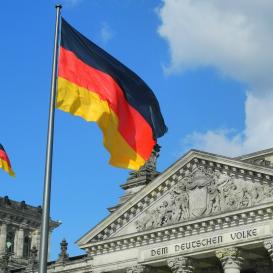The Nation Brands Index 2014 sees Germany take the lead in the ranking of best nations, because of its “sports excellence” and other qualities like exports, governance and culture. That sporting excellence surely refers back to the FIFA World Cup victory achieved this summer in Brazil, but according to Simon Anholt also reflects “its perceived leadership in Europe through a robust economy and steady political stewardship. Germany’s score gains in the areas of ‘honest and competent government’, ‘investment climate’, and ‘social equality’ are among the largest it has achieved”. So, if this is all about perceptions, how do I as a German see my country?
Football culture
I have to admit, football is huge in Germany, so winning the World Cup was an infinite improvement on ‘winning’ the Pope back in 2005, when German-born Cardinal Ratzinger was appointed Pope Benedict XVI. Football is something we all share in anyway, given that Germany is now, more than ever, a patchwork nation of different cultural backgrounds. The wonderful thing about our football team is that it reflects this change in demographics. Star players like Miroslav Klose and Mesut Ozil, who define the team with their stellar skills and whose goals carried Germany to the win, are multicultural figures everyone in Germany can identify with. And their international career in clubs raises their profile to people in other countries.

But do I agree with assessments of our honest and competent government, for instance? I can’t say that I do I’m afraid. We’ve just had weeks of discord between the governing coalition parties about creating a law to regulate toll roads. Agreed in the coalition treaty, it was initially rejected by the Federal Courts for not complying with EU law as it put citizens of other countries at a disadvantage. Neither the opposition, or the majority of the coalition partners even cared particularly about this law, but the political wing who had ensured its inclusion in the treaty were fighting for its survival in what seemed like a fight for their own survival as a relevant player in the political game. This doesn’t strike me as competent, or sympathy-inducing. Then again, every country has their monkeys in charge I suppose and in the international arena things look quite different.
Economic leaders
Having studied politics at university, all I hear is praise regarding how the Germans mastered the economic crisis, and how we’re one of the strongest countries in the EU to represent its interests internationally. I don’t dispute that. Years of Angela Merkel means that we have a consistent mind directing decisions that have yielded positive returns for Germany. Our history of supporting middle-sized and family-owned businesses, especially in niche markets, saved us, and it’s something fundamentally German. Our central location in Europe, bordering nine countries (second only to Russia), gives us a feel for what the sentiments in those countries are, and help create individual positive relationships with them.
It’s also important to keep in mind that this is a measurement of perception, not reality. German politicians have intra-party squabbles, and I’d be surprised if that were scrutinised by people abroad. Our strengths lie in domains that impact other countries, and so I can understand how we’ve reached the pole position in this ranking, demoting America to second place. Their national politics makes news around the world, and their lack of faith in their own leader doesn’t instil global faith in them. I’m glad people think Germany is great, and I can assure them it is, for a multitude of reasons not even mentioned (I love public transport here after three years in England, and I have missed bread). But nobody will ever volunteer to learn German, I guess.









